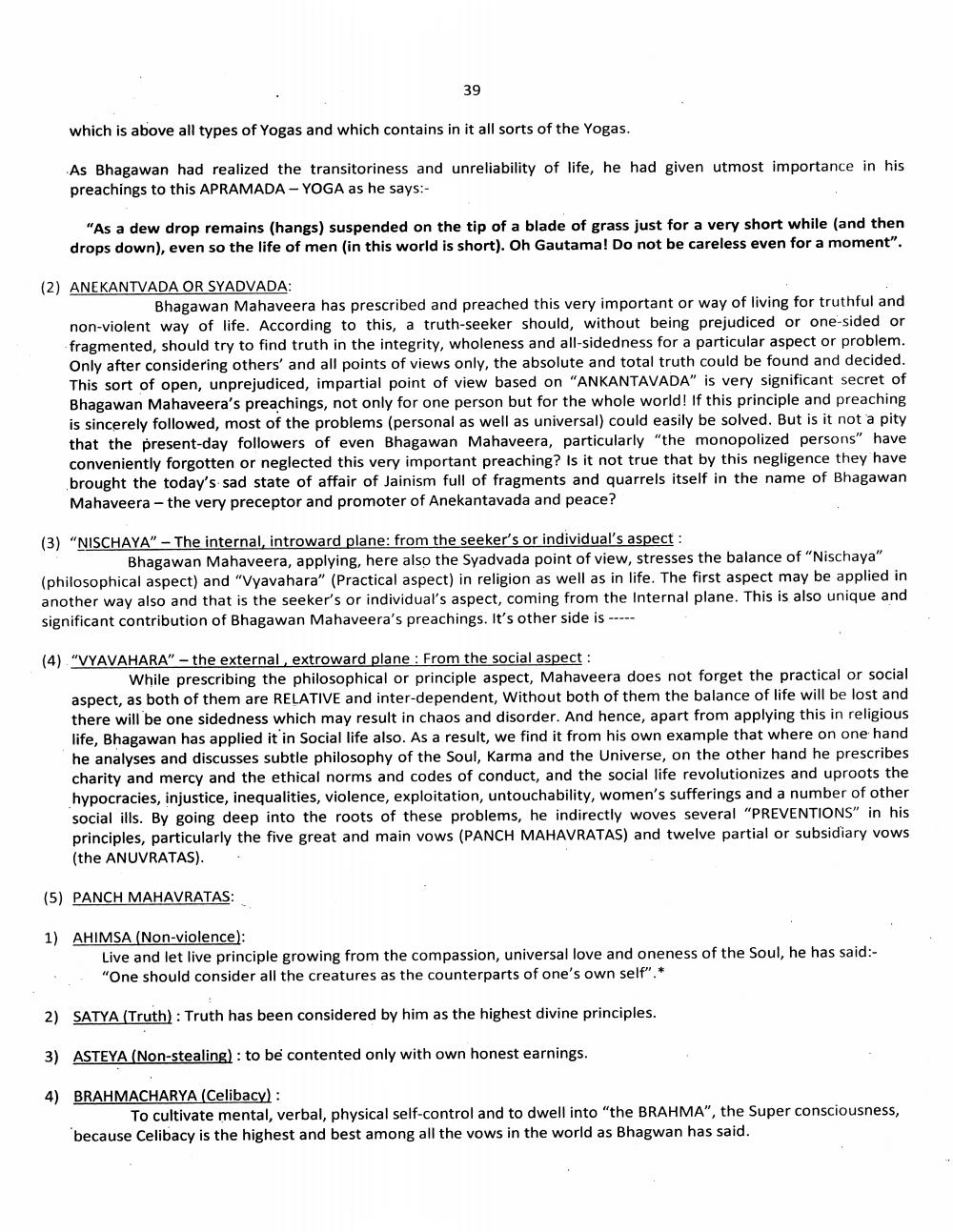________________
39
which is above all types of Yogas and which contains in it all sorts of the Yogas.
As Bhagawan had realized the transitoriness and unreliability of life, he had given utmost importance in his preachings to this APRAMADA - YOGA as he says:
"As a dew drop remains (hangs) suspended on the tip of a blade of grass just for a very short while (and then drops down), even so the life of men (in this world is short). Oh Gautama! Do not be careless even for a moment".
(2) ANEKANTVADA OR SYADVADA:
Bhagawan Mahaveera has prescribed and preached this very important or way of living for truthful and non-violent way of life. According to this, a truth-seeker should, without being prejudiced or one-sided or fragmented, should try to find truth in the integrity, wholeness and all-sidedness for a particular aspect or problem. Only after considering others' and all points of views only, the absolute and total truth could be found and decided. This sort of open, unprejudiced, impartial point of view based on "ANKANTAVADA" is very significant secret of Bhagawan Mahaveera's preachings, not only for one person but for the whole world! If this principle and preaching is sincerely followed, most of the problems (personal as well as universal) could easily be solved. But is it not a pity that the present-day followers of even Bhagawan Mahaveera, particularly "the monopolized persons" have conveniently forgotten or neglected this very important preaching? Is it not true that by this negligence they have brought the today's sad state of affair of Jainism full of fragments and quarrels itself in the name of Bhagawan Mahaveera - the very preceptor and promoter of Anekantavada and peace?
(3) "NISCHAYA" The internal, introward plane: from the seeker's or individual's aspect:
Bhagawan Mahaveera, applying, here also the Syadvada point of view, stresses the balance of "Nischaya" (philosophical aspect) and "Vyavahara" (Practical aspect) in religion as well as in life. The first aspect may be applied in another way also and that is the seeker's or individual's aspect, coming from the Internal plane. This is also unique and significant contribution of Bhagawan Mahaveera's preachings. It's other side is -----
(4) "VYAVAHARA" - the external, extroward plane: From the social aspect :
While prescribing the philosophical or principle aspect, Mahaveera does not forget the practical or social aspect, as both of them are RELATIVE and inter-dependent, Without both of them the balance of life will be lost and there will be one sidedness which may result in chaos and disorder. And hence, apart from applying this in religious life, Bhagawan has applied it in Social life also. As a result, we find it from his own example that where on one hand he analyses and discusses subtle philosophy of the Soul, Karma and the Universe, on the other hand he prescribes charity and mercy and the ethical norms and codes of conduct, and the social life revolutionizes and uproots the hypocracies, injustice, inequalities, violence, exploitation, untouchability, women's sufferings and a number of other social ills. By going deep into the roots of these problems, he indirectly woves several "PREVENTIONS" in his principles, particularly the five great and main vows (PANCH MAHAVRATAS) and twelve partial or subsidiary vows (the ANUVRATAS).
(5) PANCH MAHAVRATAS:
1) AHIMSA (Non-violence):
Live and let live principle growing from the compassion, universal love and oneness of the Soul, he has said:"One should consider all the creatures as the counterparts of one's own self".*
2) SATYA (Truth): Truth has been considered by him as the highest divine principles.
3) ASTEYA (Non-stealing): to be contented only with own honest earnings.
4) BRAHMACHARYA (Celibacy) :
To cultivate mental, verbal, physical self-control and to dwell into "the BRAHMA", the Super consciousness, because Celibacy is the highest and best among all the vows in the world as Bhagwan has said.




